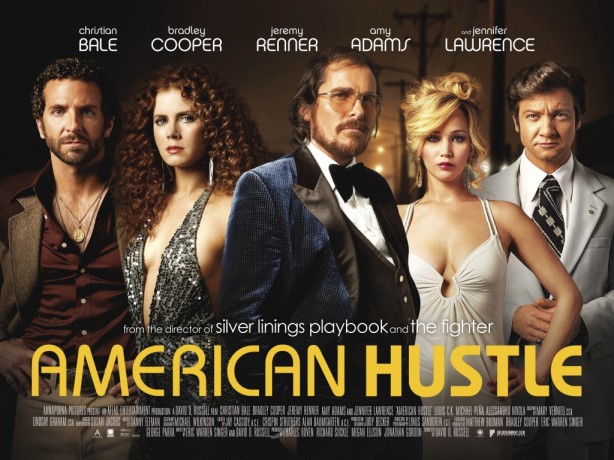
First up: read Alasdair’s piece about this film, and how everyone’s talking about the actors and no-one’s talking about the plot. Good stuff.
This was headlining at the Roxy the same night Cal & I wanted to use our tickets to the Roxy, so we saw it. And it vexed me. On a different night I could imagine walking out of it. Not that I hated it, or found it upsetting or even boring, but there was something…
Excess – director David O. Russell drives this home right from the opening, an extended and lingering view of Christian Bale’s paunchy con-man applying a hair-piece. It’s not a subtle piece of filmmaking symbolism, this sequence, and I doubt it was intended to be. (See also: the nail polish.) Even here, the camera is restless, switching attention to Bale’s hands, looking at Bale then his reflection then back at Bale. Like the camera is anxious to get moving and is being forced, like the audience, to wait. And then it goes bezerk, two hours plus of feverish swirling camera, lots of closeups, lots of dense frames full of leering people. It goes for the voiceover method to fill in backstory but even here Russell acknowledges what he’s doing and loads it to excess, keeping the voiceover running and running and running until you’re sick of Bale’s voice and then giving other characters a chance to voiceover too and then finally ditching voiceover entirely for the bulk of the film. And Bradley Cooper’s FBI goon and Jennifer Lawrence’s messed-up wife get their characters stretched like bubble gum into the same excessive mold, Cooper’s especially, both saved from rolling over into caricature only by relentless, driving editing and the fundamental ability of both actors to ground what they’re doing.
Watching this film, for me, was an exercise in frustration. I kept feeling like the film was elbowing me out of the screen, knocking me back into my cinema seat, while it barrelled on to its next set piece. It felt like this film had been so caught up in filling itself with excess that it forgot to leave space for the viewer. There was no room for me inside it.
But even then, there was much to enjoy. Amy Adams, playing “sexy” (after building a career on winsome nose-wrinkling), but at the same time going raw, nearly method, letting her face go uncomposed or, I don’t know, unpretty, shameless, while the camera zooms in for a closeup. She was great to watch, and Cooper and Lawrence kinda kept me engaged just to see how they’d manage the high-wire of their OTT characters. And Jeremy Renner (as Alasdair notes, did you read that post I linked to, dooo it) was really sharp with his uneven principled but still sort-of-shady mayor. And Christian Bale –
– oh man, Christian Bale. Maybe it wasn’t David O. Russell who wasn’t giving me room, maybe it was Bale. Dude has screen presence to burn but when I watch him, I feel like there’s something fundamentally ungenerous about how he plays. Like he’d be happiest of all if his work never had an audience at all, the only viewer there’d ever be would be the cold lens of the camera. It’s a great performance, he holds the film together, he anchors it, and he communicates every beat of the tangled/poorly-explained plot through his performance choices. But it was like an ice cube in an empty glass. I wish the film was centred on Amy Adams instead.
Oh yeah, the plot, the story, good if you cared enough to pay attention, but you didn’t need to. The two pivot points (the one that gets Bale invited on a very unpleasant limo ride, and the one that leads to Cooper’s comeuppance) are both ostensibly surprises but I expect lots of people would see ’em coming from the moment they get set up. The point is the journey through the plot, not its ability to stay a step ahead of you.
High point of the film: the woozy, boozy counterpoint of Bale/Lawrence/Renner out for dinner intercut with Adams/Cooper out dancing. All the stylistic overkill just flowed. Funny, fun, and another reminder that it is a good thing to see Amy Adams dance.
So I dunno man. Did I like this movie? Yeah! Did I dislike this movie! Also yeah! It’ll get some Oscars I guess, and lots and lots of people seem to like it just fine. But, for a movie that’s all about drawing people in, I wish it had tried to do that to me.

